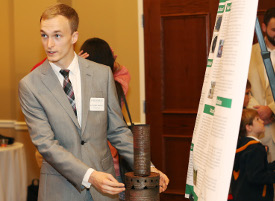JACKSON, Tenn. — May 11, 2015 — Smoke pours from the narrow chimney situated on the 55-gallon drum. Matthew Bentley stands back, watching his latest experiment produce what he hopes will one day revolutionize developing countries.
Once the fire dies out, he retrieves the instrument of this future success: BioChar.
An ancient technology, BioChar is undergoing a renewed interest by the scientific community. Essentially, BioChar is repurposed charcoal with applications that cover agriculture to sanitation.
Bentley, a senior engineering major at Union University, is researching how BioChar can best be made and used to improve quality of life in developing countries.
“BioChar is a sustainably produced, carbon-rich material produced through pyrolysis of biomass,” Bentley said. “That means that a feedstock (an agricultural product such as wood, corn cobs or rice husks) is heated to very high temperatures in the absence of oxygen.”
Bentley’s research focused on the comparison of the two different methods of BioChar production and the variety of materials that can be used to produce it.
“It has great potential in community development because it can be sustainably and inexpensively produced from nearly any feedstock with locally available resources,” Bentley said. “This means that a community can get all of the components locally, without any aid from another company, (non-governmental organization) or government.”
The development of nations aided by BioChar would allow communities to transform a natural waste product into a fertilizer and a water purifier, all without increased dependence on their government.
“A lot of the world’s need for water treatment is actually in Asia,” Bentley said. “But there’s also a lot of need in sanitation. BioChar has implications for sanitation in addition to drinking water. I know I want to be in a developing community helping people who don’t have access to clean water.”
According to Bentley, the benefits of BioChar could extend to Union University’s campus if the different science departments would research the effect of BioChar on plant life and its filtration ability.
“It has such a direct application for developing communities that doing research even at the undergraduate level could help people to understand how to implement it,” Bentley said.
Bentley said he also hoped Students for Sustainability might consider the potential of BioChar.
“It could be used in the campus garden and improve crop yield and compost,” Bentley said.
Jay Bernheisel, associate professor of engineering, helped Bentley on the project.
“Professor Bernheisel is actually on a research sabbatical, doing sustainable farming methods,” Bentley said. “He’ll probably use the BioChar for his farm that he has on his property.”
The research project began as preparation for Bentley’s graduate studies, which he plans to begin in the fall at University of Colorado in Boulder. Bentley presented his research at Union’s annual Scholarship Symposium April 28.
He plans to earn his doctorate before he and his wife, Ruth Bone Bentley, a nursing major, go overseas to work with developing communities.

